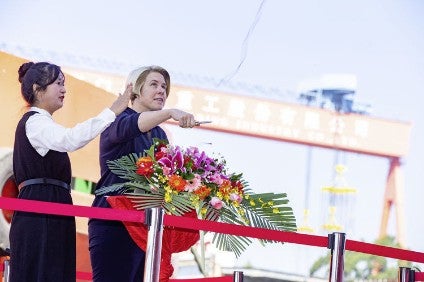
Volkswagen Group Logistics claims to be the first company to use two car freighters powered by liquefied natural gas (LNG) in overseas traffic.
The two charter ships of Siem Car Carriers were launched in Xiamen, China.

Discover B2B Marketing That Performs
Combine business intelligence and editorial excellence to reach engaged professionals across 36 leading media platforms.
Thomas Zernechel, head of group logistics, said in a statement: "We are entering a new field here to reduce emissions. Both ships are the first overseas car freighters in the world to be LNG-powered. In addition to the increasing use of LNG trucks, conversion of our many rail transports to green electricity and the use of biofuel in the short sea segment, the two new LNG ships represent an important building block for our strategic goal of climate-neutral logistics."
Christiane Eckert, head of strategy and environment in group production, officially named the ships Siem Confucius and Sien Aristotle.
Both ships will replace two of nine conventional heavy oil-powered cargo ships currently used by group logistics on the Atlantic between Europe and North America.
Siem Confucius will be integrated into this service from January 2020 after its transfer from Asia to Europe. The second ship will start operations in spring 2020 in the same area.
The LNG engines reduce carbon dioxide emissions by up to 25%, nitrogen oxide emissions by up to 30%, particulate matter by up to 60% and sulphur oxide emissions by up to 100% per ship.
The two ships, each 200m long and 38m wide, have 13 car decks and a capacity of 7,500 register tons (RT) which corresponds to approximately 4,700 vehicles.
Only a few smaller ships for rolling cargo have been built with LNG propulsion for short-haul traffic; for overseas vehicle shipments, VW group logistics is a pioneer for this type of propulsion.
Both vehicle transporters are 'in-house powered' by a 12,600 kW dual-fuel marine engine with direct injection and exhaust gas treatment from the group company MAN Energy Solutions.
In addition to liquid, deep frozen natural gas, they can also be operated with environmentally friendly e-gas produced via Power-to-X or biogas.
In eco-speed mode, the ships run at 16.5 knots (30.6 km/h). With their two tanks, each holding 1,800 cubic metres, the transporters have similar vehicle capacity and range as conventional heavy oil-powered ocean freighters.
"We believe that the switch to LNG as marine fuel is the most important basis for a maritime energy revolution," said Uwe Lauber, MAN Energy Solutions' CEO.
"In a second step, gas capable ships can be operated with synthetically produced, climate neutral fuels and are therefore future proof. With this project, Volkswagen is pioneering the decarbonisation of global trade flows".
Volkswagen Group Logistics organises, coordinates and accounts for around 7,700 ship departures worldwide each year. Several hundred liner ships and 11 car freighter charter ships sail each day. Every year they ship 2.8m new cars plus 250,000 container loads of construction and spare parts.






